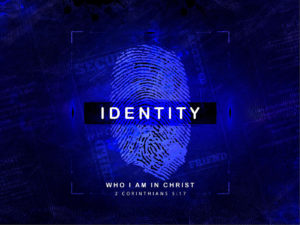 Identity is a word we hear thrown around often in our world today. We hear it attached to ethnicity, nationality, gender, politics, school affiliation and a number of other things. While driving my mother back from a medical appointment this week, she noticed that the car in front of us had an Oklahoma license plate that looked different than most that she has seen. I explained that various tribes have unique license plates. It’s another way of marking identity. Psychology Today describes identity in this way: “Identity encompasses the memories, experiences, relationships, and values that create one’s sense of self.” As Christians, what is our identity? I like to think of it in terms of two things: who we are and what we do. If we wanted to describe it using two concise words, I would use awareness and intentionality.
Identity is a word we hear thrown around often in our world today. We hear it attached to ethnicity, nationality, gender, politics, school affiliation and a number of other things. While driving my mother back from a medical appointment this week, she noticed that the car in front of us had an Oklahoma license plate that looked different than most that she has seen. I explained that various tribes have unique license plates. It’s another way of marking identity. Psychology Today describes identity in this way: “Identity encompasses the memories, experiences, relationships, and values that create one’s sense of self.” As Christians, what is our identity? I like to think of it in terms of two things: who we are and what we do. If we wanted to describe it using two concise words, I would use awareness and intentionality.Awareness begins with ourselves. We know our identity as Christians involves being made in the image of God (Genesis 1:26) and being clothed in Christ (Galatians 3:27). Even though we share those things in common, we also know that we are each a unique part of the body (1 Corinthians 12 & Ephesians 4). With the guidance of the Spirit, we are able to discern how we can serve God in His kingdom. It is up to us to seek out that awareness.
Awareness also involves the world in which we live. When we encounter people we disagree with, people who have different values or people whose reasoning we do not understand; do we try to learn more about them? Do we try to understand what makes them think differently? Our world tries to push us toward agreement, and we tend to push back. However, it is difficult to love people if we do not take the time to listen and be aware. Understanding and awareness about others is something Jesus models for us throughout the gospels. We should follow that example.
As we become more aware of ourselves and our world, we must be more intentional in our actions. Our faith was always intended to lead us to action (James 2). As we become more aware, it should cause us to act based on that awareness (John 14). We are supposed to be transformed into what God desires for us to be (Romans 12). If we know God’s primary mission for His people is to love Him, love others and make disciples; then the way we understand ourselves and others affects all of those things. We have to find ways to connect with people who do not yet know Him, and being more aware of how they see their identity is an important step toward that end. As we talked about recently in our study of spiritual disciplines, these things are not just going to happen on their own. We have to take intentional steps to get there. God is faithful to bless the process.
In our current crisis, it is essential that we have awareness and intentionality. Most of us have been forced into a change of routine. We have been forced to reconsider what is really important to us. We better understand the value of church, family and relationships. Let’s consider what we should do differently moving forward. Let’s find ways to show the love of Christ. Let’s be intentional about what we do as we gradually return to our new normal life.
– Brian
We were buried therefore with him by baptism into death, in order that, just as Christ was raised from the dead by the glory of the Father, we too might walk in newness of life. – Romans 6:4
